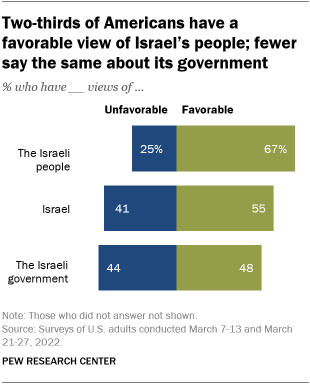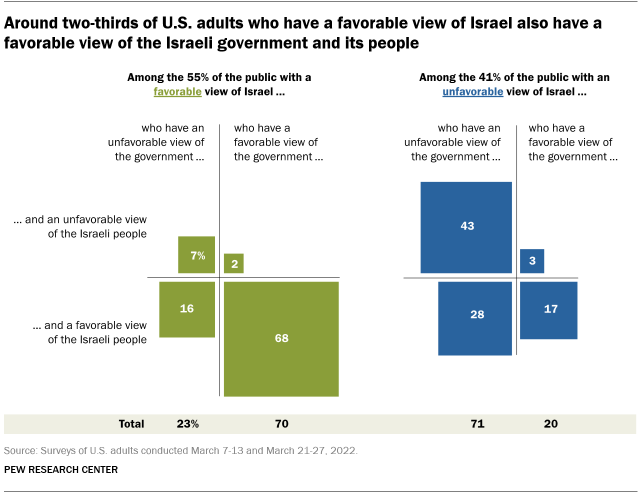Americans’ attitudes about Israel are nuanced, according to a new Pew Research Center analysis. While two-thirds of U.S. adults (67%) express a favorable view of the Israeli people, a much smaller share (48%) says the same about the Israeli government. Views of Israel as a country, meanwhile, fall in between, with a little over half of Americans (55%) expressing a favorable opinion.
This Pew Research Center analysis explores the interplay between three questions about Israel, using data drawn from two different surveys. We first surveyed 10,441 U.S. adults from March 7 to 13, 2022, using the Center’s American Trends Panel, asking them about their views of the Israeli government and the Israeli people. Between March 21 and 27, 3,383 of these same respondents were then asked about their views of Israel. This analysis draws only on people who completed both of these surveys. While previous reporting on views of the Israeli people and views of the Israeli government only used the random half of respondents who received each question first (due to a modest order effect), the analysis reported here uses all respondents who were given the three questions.
Everyone who took part in these surveys is a member of the Center’s American Trends Panel (ATP), an online survey panel that is recruited through national, random sampling of residential addresses, which gives nearly all U.S. adults a chance of selection. The survey is weighted to be representative of the U.S. adult population by gender, race, ethnicity, partisan affiliation, education and other categories. Read more about the ATP’s methodology.
Here are the questions from the first survey and its methodology, and here are the questions from the second survey and its methodology.

The Center’s analysis is based on two recent surveys and the subset of 3,383 U.S. adults who took them both. The first survey, fielded March 7-13, asked Americans about the Israeli people and the Israeli government. The second, fielded March 21-27, asked them about Israel in a more general way, as a country. Together, the two surveys provide a closer look at what Americans may have in mind when they express a favorable or unfavorable opinion about Israel.
Among Republicans and independents who lean toward the Republican Party, around six-in-ten (57%) have a favorable view of Israel as a country, the Israeli government and the Israeli people. Another 12% of Republicans have an unfavorable view of all three, while all other combinations of views are held by no more than 10% each.
Democrats and independents who lean toward the Democratic Party are more divided. Around a quarter of Democrats (24%) have a favorable view of all three: Israel as a country, the Israeli government and the Israeli people. A similar share (22%) has uniformly unfavorable views of the country, government and people. But a third sizable group also emerges among Democrats: 18% have an unfavorable view of Israel as a country, an unfavorable view of the Israeli government and a favorable view of the Israeli people. Once again, all other combinations of views are held by no more than 10% each.

These results are generally in line with the Center’s other internationally focused work, which suggests that Americans may be more likely to think about a particular country’s government than its people when they are asked about the nation as a whole.
For example, in an open-ended survey question last year, the Center asked Americans, “What’s the first thing you think about when you think about China?” In that study, Americans were more focused on the Chinese government – including its policies and how it behaves internationally – than on the people. To the degree that the Chinese people were mentioned at all (only 3% of responses mentioned the Chinese people), Americans tended to use quite favorable words. And that was true even among Americans who had lukewarm or cold views of China as a country.
The same broad pattern applies when people in other countries are asked about the United States, as the Center’s international surveys have shown. In most countries surveyed, people abroad generally express more or equally as positive views of Americans than of the U.S. as a country. Attitudes about the U.S. as a country also tend to fluctuate substantially with a change in the U.S. presidency, suggesting that people are thinking more about the government than the people.
When it comes to Americans’ attitudes about Israel, views of the country and the government are closely related, as the Center’s new analysis shows. But there can be other factors at play, too. For example, for a share of the public, positive views of the Israeli people may be enough to lead to positive views of the country, even among those who dislike the Israeli government. Other factors, such as views of a country’s cultural exports or model of government, can also play a role, coloring views of the country if not views of the government or people, as might the country’s historical or religious significance.
Around two-thirds of Americans who have a favorable view of Israel as a country also have a favorable view of the Israeli government (70%). And more than eight-in-ten of those who have a favorable view of Israel as a country also have a favorable view of the Israeli people (86%). Still, 16% of Americans who have a favorable view of Israel as a country express a favorable view of the people and, at the same time, an unfavorable view of the government.
A similar pattern emerges when looking more closely at the Americans who express an unfavorable opinion about Israel as a country. A large majority of these Americans express a negative view of Israel’s government (71%). But around three-in-ten of those who have an unfavorable view of Israel as a country simultaneously have an unfavorable view of the Israeli government and a favorable view of the Israeli people (28%).
Note: Here are the questions from the first survey and its methodology, and here are the questions from the second survey and its methodology.
